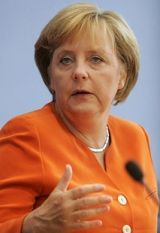Germany offers help in Ethiopia-Eritrea spat
October 4, 2007 (ADDIS ABABA, Ethiopia) — German Chancellor Angela Merkel offered to help Horn of Africa rivals Ethiopia and Eritrea resolve a long-running border dispute, and called for the rapid deployment of a joint peacekeeping force to war-ravaged Sudan as she began a tour of African nations on Thursday.

“Now it seems that the problems are mainly in the implementation,” she said. “Wherever we can be of any assistance, Germany will certainly be ready to do so.”
She did not specify what form that help would take or what had changed in a deadlock that has had both countries trading accusations for years.
Eritrea gained independence from Ethiopia in 1993 after a 30-year guerrilla war, but the border between the two was never formally demarcated. A war erupted in 1998 over the border and claimed tens of thousands of lives.
A December 2000 peace agreement provided for an independent commission to rule on the position of the disputed 621-mile border.
The neighbors have repeatedly accused each other of not honoring the terms of that deal. Tensions have increased even further with the rivals backing opposing sides in Somalia, where fighting between a weak government and Islamic insurgents has seen thousands of civilians die this year.
Ethiopia also has trouble at home, but Merkel did not directly address Ethiopia’s crackdown on opposition leaders or the insurgency in the Ogaden region, where Ethiopian troops are fighting ethnic Somali insurgents. She said she encouraged Ethiopia to be “open.”
Aid groups and the rebels accuse Ethiopia of running a police state and targeting civilians in Ogaden.
Meles used the press conference as an opportunity to send a robust response to U.S. legislators who have proposed cutting aid unless Ethiopia improves its human rights conditions.
“I don’t think it will affect the relationship between ourselves and the U.S.,” Meles said. The bill “is not fair. It is a reflection of the vendetta of a congressman. And that’s it. If this person was interested in human rights and democracy, he should have looked at Eritrea first.”
The U.S. House of Representatives unanimously approved the bill on Tuesday but it has not yet become law.
Merkel also addressed the African Union, headquartered in Addis Ababa. Germany is currently the head of the Group of Eight industrialized nations, from whom the AU has been seeking funding for peacekeeping.
Over the weekend, 10 AU peacekeepers were killed in an attack on their base in the Darfur region of Sudan. The underfunded, under-equipped AU force was to be absorbed into a larger, joint AU-U.N. force this month, and Merkel joined calls to overcome logistical and financial hurdles and speed deployment.
“The UNAMID mission must come to action quickly and will hopefully lead to the desired success,” she said, while emphasizing that “the central responsibility for peace, stability and security lies within Africa itself.”
She also used the speech to highlight the chaos in Somalia, where at least four people were killed on Thursday in gunfire and grenade attacks in the capital.
“The situation in Somalia is a catastrophe for the people there, which carries considerable dangers for the region and beyond,” Merkel said, insisting that “a political solution must be found.”
Merkel’s long-planned visit, which will also take her to South Africa and Liberia, will focus on development and trade, as well as human rights, corruption and the fight against AIDS. She is also laying foundations for an E.U.-AU summit to be held later this year.
The U.K.’s Prime Minister Gordon Brown has said he wouldn’t attend the summit because Zimbabwean President Robert Mugabe was expected. Merkel said she would discuss the human rights problems in Zimbabwe with the South African government during her trip.
“Protecting human rights is an elemental component of our programs to support peace, development and security. Protection of democracy and the state of law are equally important, for their abuse threatens peace and stability and prevents long-term development,” she told the AU.
“The crisis in Zimbabwe is an example of such abuse. We are deeply concerned about the developments there, about the bullying and threats, about the silencing of the opposition and the destruction of poor areas and the unrelenting human rights abuses.”
(AP)

Kifly Merhu
Germany offers help in Ethiopia-Eritrea spat
Dear Chancellor Angela Merkel,
the border dispute between Ethiopia and Eritrea is already resolved. Unfortunatlly, Ethiopia don’t allow the demarcation of the border, hence the EEBC couldn’t put the pillars on the ground, because the agenda of the Ethiopian government and its allies goes beyond the border. They even eyed to abolish the whole peace agreement, which they signed in Algers in 2000.
One wonders, why is the UNSC keeping silent. Why is the Ethiopian government emboldened by some quarters to adventure in the Horn, in the name of “alliance against terror”, on the cost of the Horn people.